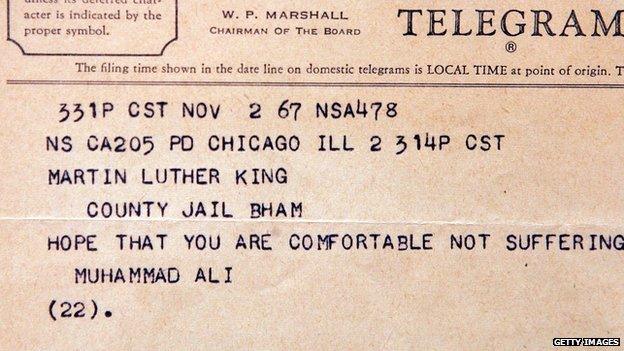Telegram Era ends Stop
- Published

Next month, the last telegram in the world will be sent when India's state-owned telecom company shuts its telegraph service. It's left a linguistic legacy, writes Kathryn Westcott.
Today "telegraphese" - saying as much as possible in the fewest words - has a new home in the Twittersphere.
What is thought to be the first telegram - What hath God wrought - was sent in 1844 in Morse Code over an experimental line from Washington to Baltimore. In 1929, more than 200m, external telegrams were sent around the world.
The booklet How To Write Telegrams Properly by Nelson E Ross, published the previous year, gave invaluable tips.
"Brevity is the soul of telegraphy," wrote Ross. Telegrams were charged by the word. Articles, prepositions and conjunctions were among the casualties.
Titles - Mr, Mrs - went by the wayside, but other social graces were worth the money, he argued.
One highly regarded American businessman had calculated that millions of dollars a year could be saved if the word "please" was dropped from telegrams.

Not all telegrams ended with STOP
But for Ross please was "to the language of social and business intercourse what art and music are to everyday, humdrum existence.... by all means let us retain the word", he wrote.
Punctuation - always spelt out in full before 1937 - was not transmitted in telegrams unless the sender specifically requested.
The exception was "stop".
OR STOP AS TELEGRAMS WERE ALWAYS WRITTEN IN CAPITAL LETTERS.
Reading "STOP" aloud gave rise to what has become known as the telegram gag.
In Blackadder Goes Forth, the format is used for trading insults.
Captain Blackadder: "To Mr Charlie Chaplin Sennett Studios Hollywood California congrats STOP Have found only person in world less funny than you STOP Name Baldrick STOP Signed E Blackadder STOP" Oh and put a PS: "Please, please, please STOP
Captain Darling: We received a telegram from Mr Chaplin himself at Sennett Studios: Twice nightly screening of my films in trenches excellent idea STOP But must insist that E Blackadder be projectionist STOP PS Don't let him ever STOP
Foreign correspondents became experts at a peculiar shorthand.
"The enemy has not yet been met or even seen on account of the entanglements thrown up during the night," would be dispatched as: "Enemy unmet unseen account entanglements upthrown night".
Codes were once commonplace in business telegrams.
For "sell 10,000 bushels of May wheat at $1.45 1/4" the message might read: "Sell barney stoke", explained Ross. Barney means 10,000 bushels of May wheat, while "stoke" means "1.45 1/4".
But codes went wrong elsewhere.
A reporter wanting to know the age of actor Cary Grant sent: HOW OLD CARY GRANT.
The actor's supposed response?
OLD CARY GRANT FINE. HOW YOU.
You can follow the Magazine on Twitter, external and on Facebook, external